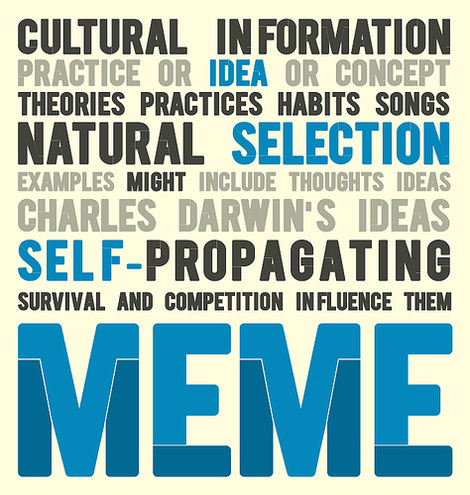 The term "meme" did once have some competition.
The term "meme" did once have some competition.- Edward Burnett Tylor (1871) used the terms "customs" and "survivals";
- Richard Semon (1921) called similar entities "mnemes";
- George Kingsley Zipf (1935) used the term "actemes";
- Arthur Oncken Lovejoy (1936) used the term "unit-ideas";
- Julian Huxley (1955) used the term "mentifacts";
- Leslie White (1959) called products of symbolism "symbolates";
- Henry Murray (1959) called them "idenes";
- Donald Campbell (1960) called them "mnemones";
- Harold Blum (1963) endorsed "mnemes" by coining "mnemotype";
- Ted Cloak (1966) used "Unit of Cultural Instruction";
- Ralph Burhoe (1967) called them "culturetypes";
- Ted Cloak (1975) used the term "cultural instructions";
- Lumsden and Wilson (1981) called them "culturegens"
- Carl Swanson (1983) called them "sociogenes";
- Boyd and Richerson (1985) called them "cultural variants" - having previously used the terms "culture-types", "cultural representations" and "cultural traits".
- M. Stuart-Fox (1986) called them "mentemes";
- George Williams (1992) used "codex" as an umbrella term for memes and genes;
- Richard Brodie (1996) prefered to talk about "mind viruses";
- Joseph Giovannoli (2000) calls them "psychogenes";
- Seth Godin (2000) refers to "ideaviruses";
- William Croft (2000) used linguemes" for "linguistic replicators";
- Aaron Lynch (2000) used a term he invented: "thought contagions";
- Barry Hewlett (2002) calls them "semes";
- Geoffrey Hodgson (2003) proposed we use "habits" and "routines" instead;
- Peter Turchin (2006) called them "cultural genes";
- George van Driem (2007) rechristened the unit of imitation as a "mime";
- Craig Mackay (2011) calls them "supergenes";
- Bill Benzon (2014) calls them "coordinators" [ref];
However, none of these other terms has become anywhere near as popular as the term "meme".
At the time of writing, the term "meme" has 219,000,000 hits on Google.
The large number of close synonyms -and the large number of usages - suggest an important, natural term.
For graphs of the statistics for previous usage of the term, see here.










No comments:
Post a Comment